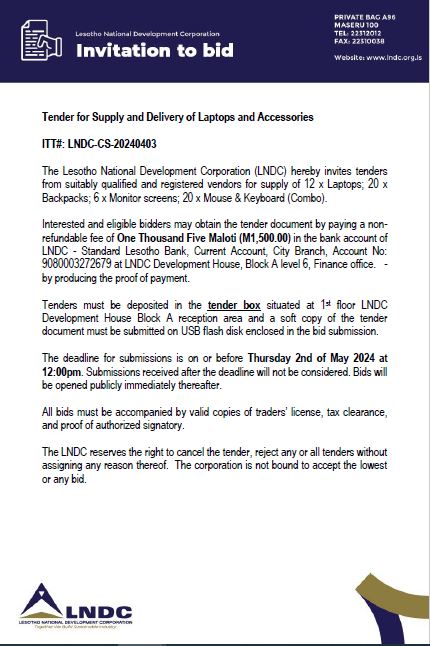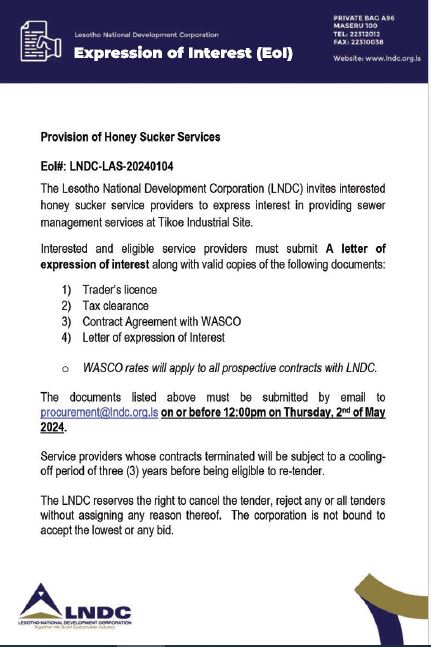Mohloai Mpesi
The Independent Electoral Commission (IEC) is one of the state institutions that have enjoyed a long spell of favourable press and unquestioned credibility since it was established in 1998.
But that record is now under threat due to adverse court decisions.
To make matters worse, the European Union Election Observation Mission (EU EOM) last week said IEC’s credibility was affected by announcing incorrectly calculated results for four Proportional Representation (PR) seats.
Following counting of the votes for the national assembly elections which were held on October 7 this year, IEC awarded 11 of the PR seats to the Democratic Congress (DC) and three to the Alliance of Democrats (AD).
The rest of the seats were allocated to other political parties.
IEC later found that it had apparently done a mistake, it was supposed to have allocated eight PR seats to DC and two to AD.
On October 22, it filed an urgent application in the High Court in its constitutional jurisdiction for an order to review, correct and set aside as irregular the allocation of PR seats in so far as that allocation gave DC 11 seats and AD two.
IEC also wanted an order granting it leave to amend the allocation of PR seats allocated to AD from three to two and those allocated to DC from 11 to eight.
Last week the high court ruled that in its constitutional capacity, it did not have the authority to decide the case and struck it off the roll.
“Legal uncertainty few weeks before the elections posed challenges to the IEC, parties, candidates, and voters. Nevertheless, the IEC was able to conduct most of its activities according to the electoral calendar, notwithstanding the persistent financial shortcomings,†read the EO EOM final report published on Monday last week.
“However, its credibility was affected by announcing incorrectly calculated results for four PR seats,†the report added.
IEC’s director of elections, Mpaiphele Maqutu, told Newsday on Wednesday that the commission was not fazed by what the report said.
“This aspect of credibility was not even the main finding. There are seven main findings and none of those findings makes reference to the fact that the IEC’s credibility to hold current and future elections is in question,†Maqutu said.
“It was a just a subsidiary observation in the report. It does not even enjoy the status in the main findings of the report,†he added.
He said the EU mission complimented the work done by IEC “based on international benchmark that measures whether the conduct of the elections is reflective of the resultsâ€.
To drive his point home, Maqutu said even after the error in allocating PR seats was identified, the party that won the most seats remained the winners.
“The error only mainly affected small parties which were supposed to have representation in parliament but did not because seats that were supposed to have been allocated to them were allocated to other parties,†he said.
He said IEC was transparent in that when it identified the error, when no one else had picked it up, it did not look the other way but called all the affected parties to tell them about the error.
“We called all the affected parties and all of them unanimously agreed that they realise the mistake as numbers do not lie,†he said.
He further indicated that although all the parties agreed with IEC that there was an error, DC later somersaulted and opposed the commission’s application for review in the high court.
“They were all content with the results to a point where the most affected party, DC, also started convincing other parties. So we left the meeting with an understanding that this was a genuine error which was not anchored on any form of negligence or malice,†Maqutu said.
“What happened was that the supporters challenged the leadership of their parties by even going out to say perhaps they got confused and failed to apply their minds correctly on the matter.
“We were surprised when because of pressure, DC turned around and challenge our case when they had initially understood and had no qualms with it,†he added.
AD, on the other hand, he continued, has not indicated that it is against the commission’s endeavor to re-allocate the seats.
Some commentators have called for the resignation of the three IEC commissioners after it emerged that the commission had made an error when allocating PR seats.
The three IEC commissioners are chairperson Mphasa Mokhochane, Dr Karabo Mokobocho-Mohlakoana, and TÅ¡oeu Petlane.
Maqutu on Wednesday defended them.
He said the error was not made by the commissioners alone but by a joint seating which included representatives of political parties.
“The formula used to calculate PR seats for each political party is contained in the National Assembly Electoral Act of 2012. The seats were calculated in the presence of party representatives and it was agreed by all that those are the correct figures that should be announced. No one picked up the error,†he said.
“We published the results of PR seats together, so what could have evaded IEC on the calculation literally evaded all of us. But that does not erase the fact that the overall responsibility rests on the shoulders of the IEC,†he added.
He continued that the credibility of the commission was not tainted by the error at all.
If the commission was made up of people with zero credibility, he said, they could have kept quiet and no one could have discovered the error
“But when they realised the error, they were brave enough to announce it publicly. Those are the kind of people we need to run the country’s elections in the future,†he said.
Maqutu also emphasized that the three commissioners “are honest and boldâ€.






